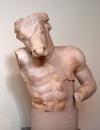Pluto is the brother of Zeus. He rules the underworld, Hades. Hekate has the power to walk in his realm. They both share the same symbol: keys and they are related to dogs. Hekate and Persephone share some common properties, that's why they were unified in ancient times. Let's see the characteristics of Pluto, the king of the underworld.
Pluton (Πλούτων) is son of Kronos and Rea and brother of Zeus and Poseidon. He received the kingdom of Hades after the defeat and crumbling of the Titans where he set up his throne in the middle of Hades. Hades means eternal. Plouton could not accept any living being in his kingdom and that's why he had as guardians of his kingdom many terrible monsters.
Plouton is the God of the dead which he accepts them in his infernal Kingdom. He also deals with the living as he tells Persephone “always the unfair people will be punished” as he oversees the observance of rules of the law.
From him depends the fertility of the earth as anything that comes out of the ground is a gift of Plouton. He is equal reason and main sponsor of the treasures that are surrounded in the earth. He provides the mortals with plentiful products of the earth's surface and in parallel, he makes available the metals and minerals of the earth to them.
The principal sanctums of Plouto were about oracles with the spirit of the dead and medical oracles. The medical oracles were visited by sick people where they were coming to ask Plouton for life. As he has the power to take a life he has the power to give life as well. People who wanted to try this kind of divine medicine were visiting the village that was close to the cave of the medical oracle. There were priests who were entering themselves the cave instead of the patients and they were advising them about what medical cure to follow according to the dream they had seen. Sometimes the patients were entering the cave and they were staying in there for many days without food. In their sleep they had dreams that were guiding them but they had to take the advice of the priest because the dreams were complicated and not easy to understand.
Plouton was represented as a wild, terrible king sitting on his throne holding in his right hand a sceptre or a pitchfork. His throne was made up of sulphur being put in a dark spot. Sometimes he holds the keys of Hades. Next to him is sitting his wife Persephone, daughter of Demetra and Zeus. Around them, there were the other gods that had duties in Hades such as Fates. His diadem was made of ebony. Sometimes he is described as sitting on a chariot being pulled by four black horses whose names are Aithon (Αΐθων), Nyktefs (Νυκτεύς), Orfnaios (Ορφναίος) and Alastor (Αλάστωρ). He was also drawn grabbing Persephone or feeding Kerverus or sitting on tombs.
Sacred plants to Plouton are narcissus, boxwood, pine tree, adiantum and other evergreen acarpous plants. Sacred places to Plouton were considered the places that were giving the impression that they were in relation to the underworld such as caves. The caves took the name “ploutonia” from Plouton's name.
Connection with Hekate
Hekate appears to be present and guider in people's times of transition such as death sharing similar duties with Plouton. Both chthonic deities are present in that transformation of the soul playing significant role to the soul's trip to the underworld. Both deities have as symbol the keys as both hold the keys of Hades. Plouton is drawn with Kerverus a three-headed dog guardian of the gates of Hades, a relationship with dogs and three heads associated with Hekate as her epithets indicate skylakitis = protector of dogs, trissokarinos = with three heads.
From the mythology we can see that so Hekate as Plouton are associated with the return of Persephone to the earth. Hekate informs Demeter about Persephone and Plouton compromises and let Persephone to return to her mother. Persephone plays the role of a seed that is under the earth (in Hades with Plouton) and with Plouton's permission she goes up. Hekate in that part plays the role of the mysterious force that is responsible for the beginning of life (transition again) and an the end she is guiding Persephone back to her mother indicating how significant and catalytic was her role in the circle of life.
























It amazes me how so many traditions follow these ancient protocols and roles,